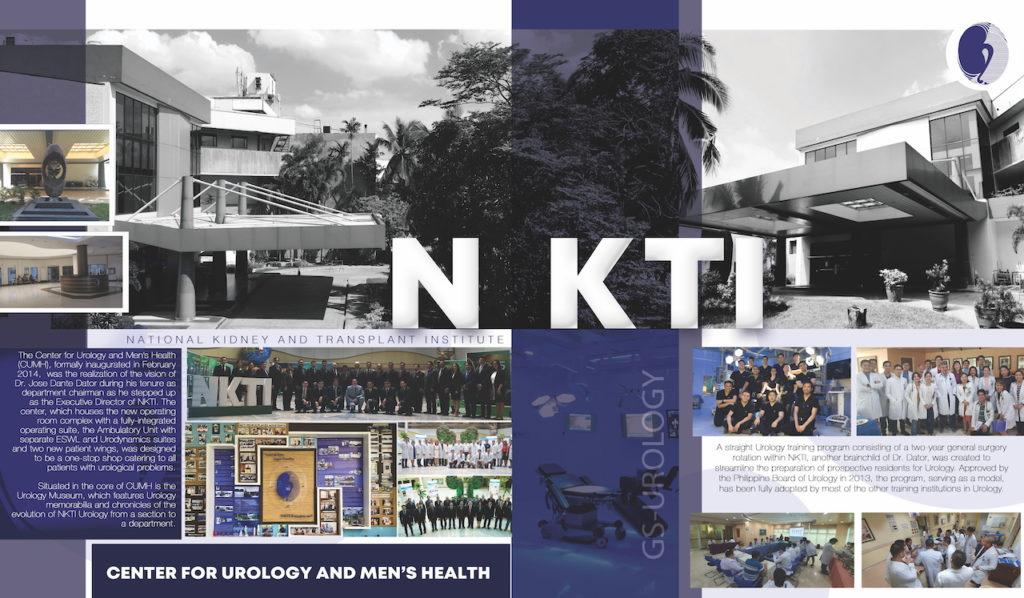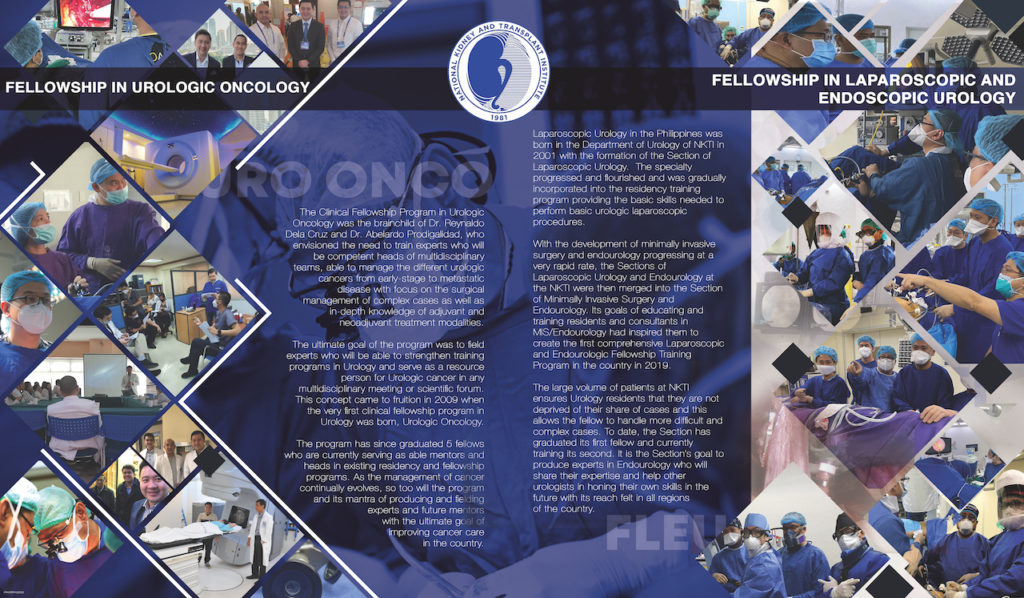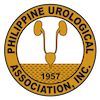About
HISTORY OF NKTI
The creation of the National Kidney Foundation of the Philippines (NKFP), which later became the NKTI, in 1983 is closely intertwined with the birth of the section of Urology which together with Nephrology were the cornerstones of the specialty hospital dedicated to renal and urologic conditions together with transplantation. Through the initiative of Dr Claver Ramos, its first director, Dr. Benjamin Magsino from Makati Medical Center recruited the best and brightest urologists at that time to form the section, namely Dr. Genaro Yusi, from the UP-PGH and Dr. Abelardo Prodigalidad, from UERM and UST all 3 of them coming from training at prestigious centers in the United States namely, Brooklyn Jewish Hospital and Medical Center, University of Iowa, NYU-Memorial Sloan-Kettering Medical Center, respectively. This triumvirate who didn’t know each other personally from the start became solid friends and professional partners laying down the foundation of the department eventually establishing the training program that became accredited by the Philippine Board of Urology in 1986.
Two young GS residents were recruited, Drs Eduardo Rivera and Nelson Patron, successfully completing their training amidst the construction activities amidst birthing pains of the new Institute, becoming the very first graduates in 1987. They were later absorbed to become junior consultants of the department. From an initial 50 bed hospital that was “carved” out from one of the wings of the Lung Center of the Philippines which was shared with the nephrology service, the growing department started the modern practice of urology equipped with the current armamentarium and tutored by the “masters” themselves. One landmark event at NKTI in 1983 was the first living related kidney transplant.
Because of the esteemed reputation, skills, and professional network of the founders – the patients came from all walks of life with an exponential growth in consultations and surgeries in the years that followed.
The Growth & Expansion of the Department (the many firsts)
- The first urology group practice in the country
- Emergence of sub-specialization thru recruitment and training of new faculty.
- Endourology – Dr Benjamin Mendoza was sent by the group for training in various centers abroad and the first PCNL performed in 1988.
- Urologic Oncology – Dr Reynaldo dela Cruz from Dalhousie University, Canada
- Pediatric Urology – Dr Jose Dante Dator, from Boston Children’s Hospital, in 1992 – formalized the subspecialty by creating and forging a partnership with Pediatric Nephrology with its own clinic and ward. The first successful closure of bladder exstrophy was one of the highlights of the subspecialty in 1993.
- The first urodynamics facility in 1992 with a LifeTec machine that was set-up by Drs Dante Dator and Eduardo Rivera, the latter also after being sent for training in Singapore. At that time, NKTI urology was the referral center for urodynamics.
- The first ESWL in the Philippines – the EDAP LT-01 machine that was initially housed at the NKTI in 1989 and eventually transferred to a private hospital because of regulatory concerns. (The core of this machine is now at display the the Urology Museum of the department, which is recognized by the William Didusch Center for Urologic History of the AUA)
- Broke the male dominated Urology specialty by graduating the first female Urologist in the Philippines, Dr. Ellen Vercelles in 1992.
- Acquisition of the latest endourologic equipment that by virtue of being a GOCC hospital (government corporation) allowed the group the leverage to acquire them in a timely manner.
- The first HIFU (high intensity focused ultrasound) – minimally invasive treatment for prostate cancer – sending Dr Genlinus Yusi for training in France in 2006.
- Laparoscopic Urology – started upon return from training by Drs Jose-Vicente Prodigalidad and Ernesto Gerial, Jr. who eventually honed their skills at the NKTI to establish the leadership in this subspecialty.
- The Center for Urology and Men’s Health – established when then executive director Enrique Ona completed the conversion of Wards 3E and 3F into dedicated service areas which eventually was completed during the term of executive director Dr Dante Dator when the 2nd floors administrative areas and first floor operating room expansion and ESWL/urodynamics facility was completed in 2014.
- The first fully modular OR One (Storz) to complement the growing minimally invasive subspecialty (2014).
- The Buenaventura Memorial Lectures running since 2010 and has been instrumental in bringing to the NKTI the “who’s who in urology” in the world, in partnership with the PUA.
- The Donald Marshall Memorial lecture – hosting Dr Peter Carroll from the UCSF, a leading academician of the AUA for Prostate Cancer in 2012.
- Published 2 editions of clinical practice guidelines in urology
- One of the first to adopt the use of lasers in urology by acquiring 2 laser machines (Holmium and Thulium lasers) in 2009 for stones and soft tissue.
- First and only training institution which has its own Fellowship Programs in Urologic Oncology, and Minimally Invasive Urology.
- The first full laparoscopic renal donor nephrectomy in the Philippines was done on Feb 2004 by Dr. Peter Breten and Dr. Ernesto Gerial Jr.
- The Straight GS-URO training program was started in 2013, a unique set-up for NKTI who did not have a formal GS training program.
Today the department has fulfilled the mission and vision of the founders and has remained to be the future leaders and trainors to continue the tradition, excellence, professionalism and integrity as we continue to attract the best and brightest minds in Urology
Mission
To provide the best, individualized care to all the patients we serve while advancing urologic cancer care for the future.
Vision
To be the first choice for urologic cancer management in the country,
What the Program can offer
- Practical, hands-on experience with cancer surgery, particularly complex surgery with more than adequate numbers
- Practical experience with systemic therapy
- Regular multidisciplinary meetings and conferences
- Exposure to minimally invasive cancer surgery
- Exposure to clinical trials
- Optional rotation in a University-based cancer center in the US during the final year of training
Requirements for Acceptance
- Each prospective applicant should be either a graduate of an accredited Urology training program or a senior resident of an accredited program who will be graduating in time to start the fellowship
- Letter of intent addressed to the program director
- Three letters of recommendation from consultants, diplomates of the PUA, who will be able to personally vouch for the character and credentials of the applicant
- A written entrance exam will be given on a designated day
- A panel interview conducted by the members of the fellowship program’s core training group
- All applicants who are accepted will be required to be fully certified Diplomates of the Philippine Board of Urology or be certified as such during the course of their 2-year fellowship training to be able to qualify for graduation from the program
Expected Outcomes for Graduates
- Every graduate of the program is expected to be proficient as head of a multidisciplinary team handling all Urologic Cancers especially the 3 mainstream cancers (Prostate, Kidney and Urothelial cancer)
- Acquired expertise in the listed index operations, complicated operations and competent handling of complications including proficiency in systemic therapy
- Expertise in the management of all aspects of cancer care for Urology from preoperative work-up and preparation to adjuvant therapy post-surgery and follow-up care. The graduate is expected to be extremely competent in the management of cancer from early stage to metastatic disease including non-surgical modalities (systemic therapy, radiation therapy, nutrition, and palliative care)
- The ultimate goal of the program is to produce an expert in the field who will be able to strengthen an existing residency program in Urology as a trainer and serve as a resource person for Urologic cancer in any multidisciplinary meeting or scientific forum
RESIDENCY TRAINING PROGRAM FOR UROLOGY
REQUIREMENTS FOR THE GS-URO RESIDENCY TRAINING PROGRAM:
Letter of Intent addressed to:
GENLINUS D. YUSI, MD, FPUA
Chairman, Department of Urology
National Kidney and Transplant Institute
THRU:
AMIHAN A. BANAAG, MD, FPCS
Officer-in-Charge, Department of Surgery
National Kidney and Transplant Institute
Curriculum Vitae 2 copies with 2×2 picture
Original Copy Medical School Transcript
Verification of graduation from Medical School
College Diploma and TOR
PRC Certificate with Board Ratings
Valid PRC card – photocopy front and back
Three letters of reference from attending physicians familiar with the individual’s performance
Internship certificate
Class standing and WT Average
Basis for Evaluation of Applicants
- Written Examination covering both Urology (50%) and General Surgery (50%) will be given to all applicants.
- Personal Interview with a panel consisting of at least three Attending Consultants. The schedule for Interview is not negotiable. Failure to show up at the Interview implies disinterest in the program, thus such applicants will be dropped from the deliberation list.
- Letters of Recommendation
- Other factors (location of future Urologic practice, tie-up with a Provincial Hospital, etc.)
Description of the Urology Residency Training Program
The Training Program is fully accredited by the Philippine Board of Urology. The program consists of four years of Urology residency. Exposure to ALL aspects of Urology is paramount with emphasis on completely “hands-on” major, minor and endourologic surgery, decision-making responsibilities, conferences and didactic lectures with the consultants.
The program is the ONLY training program in the country where residents have EXTENSIVE hands-on exposure and DIRECT management and decision-making in Transplant Urology, Minimally-Invasive Prostate Cancer Surgery, Urologic Ultrasound, Extra-Corporeal Shockwave Lithotripsy, Percutaneous Renal Stone Surgery, Laparoscopic Urology, and Urodynamic Studies.
Our residents have supervised decision-making responsibilities towards our Service Patients as well as exposure to the individual therapeutic styles of their consultants towards the latter’s Private patients.
Depending on the available slots, two to three first year residents are selected. The residency training program is designed with a step-ladder approach, such that for each year level, duties and responsibilities as well as the complexity and difficulty of surgical procedures are increased gradually.
Outside Rotations
Although the training exposure our residents attain at the NKTI is quite extensive, we are not content to rest on our laurels. We have identified several aspects of Urology where it would be more advantageous for our residents to gain experience in other institutions.
During the 3rd year, our residents rotate in the Section of Urology at the UP-PGH Medical Center. Their main training objective there is to learn and have hands-on experience in Urologic Trauma and Out-Patient Open Procedures. The UP-PGH is one of the, if not THE finest trauma center in the country, and this translates to extensive exposure to Urologic Trauma for our residents.
During the 4th year, our residents rotate at the Veterans Memorial Medical Center, Section of Urology. Their main training objective there is to gain extensive experience in transurethral and open benign prostate surgery.


